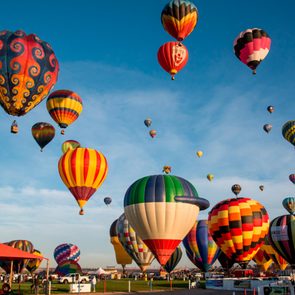Why Is Oktoberfest in September?
Updated: Jul. 11, 2024

Oktoberfest’s namesake month barely gets to take part in the festivities, so why is Oktoberfest in September? Here's what to know.
Oktoberfest is a German tradition known worldwide for its beer, delicious food and celebration of German culture. It’s a chance to put aside differences, raise a glass and shout “Prost!” (That’s “Cheers!” in German.) Given the name, one would think that it would also be a chance to celebrate the great month of October. And it is. What’s shocking, though, is that this festival’s namesake month barely gets to take part in the festivities. So why is Oktoberfest in September? And given that weird fact, why is it called Oktoberfest in the first place?
Whether you’re a German looking to celebrate this year or a first-time American reveler, we have all the details below. Of course, you don’t have to be German to enjoy Oktoberfest—people of all backgrounds can come together to celebrate their communities, and here’s how to do that.
Get Reader’s Digest’s Read Up newsletter for more holiday tips, fun facts, humor, cleaning, travel and tech all week long.
When does Oktoberfest start and end?
The majority of Oktoberfest takes place in September, which makes this holiday seem like one of the world’s biggest misnomers. And the festival runs 16 to 18 days, depending on the year. This year, Oktoberfest 2024 starts on Saturday, Sept. 21, and goes through Sunday, Oct. 6. Here are the future Oktoberfest dates for 2025 and beyond:
- 2025: Saturday, Sept. 20, to Sunday, Oct. 5
- 2026: Saturday, Sept. 19, to Sunday, Oct. 4
- 2027: Saturday, Sept. 18, to Sunday, Oct. 3
However, when Oktoberfest began way back in 1810, it did take place entirely in October—from the 12th to the 17th.
Why is Oktoberfest in September?

You’ll have to learn about Oktoberfest’s history to know exactly why Oktoberfest starts in September. The first Oktoberfest celebrated the marriage between Bavarian Crown Prince Ludwig and Princess Therese von Sachsen-Hildburghausen. It lasted five days, during which the citizens of Munich were invited to eat and drink to their hearts’ content while listening to live music and watching parades. The party ended with a horse race at the edge of town.
It was such a success that this celebration grew to become an annual festival, complete with every attraction that made the first so enjoyable. As the festival got longer, the starting Oktoberfest dates were moved into September because the days were longer and the weather was warmer. Visitors could stay out later to enjoy the gardens and the famous fields that make up the festival grounds without getting chilly.
In an effort to adhere to the original dates (albeit loosely), the last weekend of modern Oktoberfests always takes place in October, usually ending on the first Sunday of the month. If the first Sunday in October is the 1st or 2nd of the month, the festival is extended slightly to run until Monday or Tuesday, whichever day Oct. 3 falls on. This is so that it can coincide with the public holiday Tag der Deutschen Einheit, or Day of German Unity. Germans call this a “good” year, and we can’t argue with that.
Why is it called Oktoberfest?
Oktoberfest gets its name from the German word Oktober, which means—you guessed it—October. Festivals worldwide, including many in the United States, often use the German spelling to pay homage to the event’s Bavarian heritage, though you’ll find a few celebrators opting for “October.”
Where is Oktoberfest held?
Oktoberfest is the ultimate beer bash held every year in Munich, Germany, on a massive 100-acre party zone called Theresienwiese, right in the heart of the city. But you don’t have to fly to Germany to join the fun! Communities all over the United States throw their own Oktoberfest shindigs, bringing the Bavarian spirit stateside with plenty of beer, bratwurst and good vibes!
Do you need tickets for Oktoberfest?
No, you do not need tickets for Oktoberfest if you’re attending the event in Germany. Even better, the festival is free and anyone can join the activities. Just be ready to wait in line, as security checks bags to ensure everyone can kick back and enjoy the festivities safely.
What is Oktoberfest beer?

Oktoberfest beer is all about the Märzen, a classy German amber lager bursting with a rich and bready malt goodness. The taste is described as being balanced by just the right amount of bitterness and a dry finish that makes you want to take another sip. While Märzen in the United States is brewed in March and aged until fall, the actual Oktoberfest festival serves up paler brews more like the classic German lagers we know, similar to the Dortmunder style.
How do you dress for Oktoberfest?

There’s no dress code for Oktoberfest, but the real fun happens when you embrace the Bavarian spirit with traditional attire, known as tracht. For the ladies, that means donning a dirndl—a sleeveless dress paired with a blouse and apron, just like the St. Pauli Girl. Gents rock lederhosen, those iconic embroidered leather shorts with suspenders, usually worn with a plaid or white shirt. Dressing up isn’t required, but it definitely cranks up the festive vibes!
Why trust us
At Reader’s Digest, we’re committed to producing high-quality content by writers with expertise and experience in their field in consultation with relevant, qualified experts. We rely on reputable primary sources, including government and professional organizations and academic institutions as well as our writers’ personal experience where appropriate. We verify all facts and data, back them with credible sourcing and revisit them over time to ensure they remain accurate and up to date. Read more about our team, our contributors and our editorial policies.
Sources:
- Munich Oktoberfest: “History of the Munich Oktoberfest”
- Malteurop Malting Company: “The History of Oktoberfest Beers and the Malts That Made Them”
- Rare Dirndl: “What to Wear at Oktoberfest: The Complete Guide to Wearing a German Dirndl”























